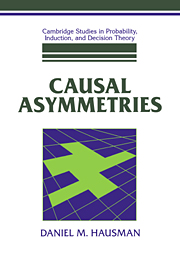Book contents
- Frontmatter
- Contents
- List of Figures
- Acknowledgments
- Introduction: Causation and its Asymmetries
- 1 Metaphysical Pictures and Wishes
- 1* Transfer Theories
- 2 Is Causation a Relation Among Events?
- 3 Causation, Regularities, and Time: Hume's Theory
- 4 Causation and Independence
- 4* Causation, Independence, and Causal Connection
- 5 Agency Theory
- 5* Causal Generalizations and Agency
- 6 The Counterfactual Theory
- 6* Independence and Counterfactual Dependence
- 7 Counterfactuals, Agency, and Independence
- 7* Agency, Counterfactuals, and Independence
- 8 Causation, Explanation, and Laws
- 8* Causation, Explanation, and Independent Alterability
- 9 Probabilistic Causation
- 10 Causation and Conditional Probabilities
- 10* Causal Graphs and Conditional Probabilistic Dependencies
- 11 Intervention, Robustness, and Probabilistic Dependence
- 11* Interventions and Conditional Probabilities
- 12 Operationalizing and Revising the Independence Theory
- 12* Probability Distributions and Causation
- 13 Complications and Conclusions
- Appendix A Alphabetical List of Propositions
- Appendix B List of Theorems
- References
- Index
6* - Independence and Counterfactual Dependence
Published online by Cambridge University Press: 20 April 2010
- Frontmatter
- Contents
- List of Figures
- Acknowledgments
- Introduction: Causation and its Asymmetries
- 1 Metaphysical Pictures and Wishes
- 1* Transfer Theories
- 2 Is Causation a Relation Among Events?
- 3 Causation, Regularities, and Time: Hume's Theory
- 4 Causation and Independence
- 4* Causation, Independence, and Causal Connection
- 5 Agency Theory
- 5* Causal Generalizations and Agency
- 6 The Counterfactual Theory
- 6* Independence and Counterfactual Dependence
- 7 Counterfactuals, Agency, and Independence
- 7* Agency, Counterfactuals, and Independence
- 8 Causation, Explanation, and Laws
- 8* Causation, Explanation, and Independent Alterability
- 9 Probabilistic Causation
- 10 Causation and Conditional Probabilities
- 10* Causal Graphs and Conditional Probabilistic Dependencies
- 11 Intervention, Robustness, and Probabilistic Dependence
- 11* Interventions and Conditional Probabilities
- 12 Operationalizing and Revising the Independence Theory
- 12* Probability Distributions and Causation
- 13 Complications and Conclusions
- Appendix A Alphabetical List of Propositions
- Appendix B List of Theorems
- References
- Index
Summary
After briefly discussing two other counterfactual theories of causation, this chapter formulates the account of similarity among possible worlds employed in chapter 6 and proves the claims it makes.
Mackie's Counterfactual Theory
John Mackie argued,
if on a particular occasion A's doing X is causally related to B's doing Y, and if they had not been so related but things had otherwise been as far as possible as they were, A would still have been doing X but B would (or might) not have been doing Y, then /Ts doing X is conditionally and causally prior to ZTs doing Y. (1979, p. 24)
For example, suppose one breaks the connection between a car's engine and its wheels: the engine continues turning while the wheels stop.
Let us call the event of A's doing X on the particular occasion “a” and the event of B's doing Y on the occasion “b” Suppose that in the closest possible world in which some event c failed to occur, a would not be causally connected to b. If the causal connection between a and b depends on the existence of c, then c must be a cause of at least one of a or b. On Mackie's view a is causally prior to b if and only if, in the absence of some minimal difference c, a still occurs, but b does not (B does not do Y). So c causes b only. Mackie thus indirectly assumes that there are causes of b that are not causes of a, and this assumption is, of course, an immediate implication of both CP and agency views.
- Type
- Chapter
- Information
- Causal Asymmetries , pp. 131 - 138Publisher: Cambridge University PressPrint publication year: 1998



